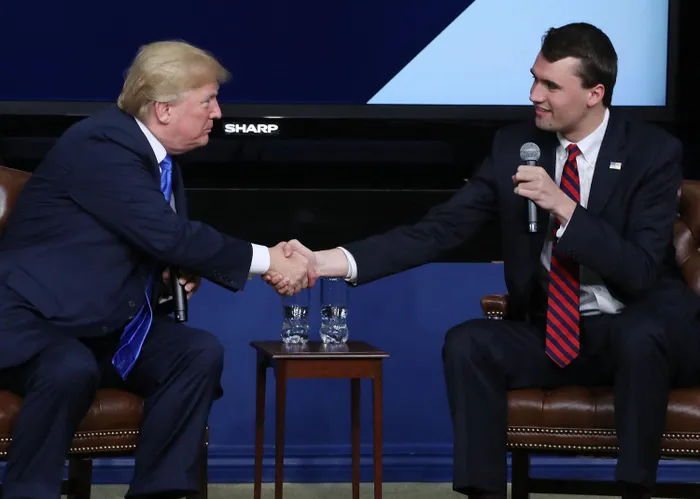
US President Donald Trump shakes hands with conservative activist Charlie Kirk at a forum dubbed the Generation Next Summit at the White House on March 22, 2018 in Washington, DC. Right-wing youth activist and influencer Charlie Kirk, a major ally of President Donald Trump, was shot dead last week in an apparent assassination that sparked fears of more political violence in an increasingly febrile United States.
Image: MARK WILSON / GETTY IMAGES NORTH AMERICA / AFP
A Pretoria-based religious organisation has called on “all people of goodwill”, across political and religious divides to defend free speech, stand for non-violence and “let faith inform action – offering compassion, integrity, and truth, not coercion or extremism”.
The South African Community of Faith-based Fraternals and Federations (SACOFF) made the call following the shooting of young US right-wing firebrand Charlie Kirk who was fatally wounded while engaging in a public debate at a university last week.
SACOFF hailed Kirk for his “boldness, his convictions, his willingness to challenge and to be challenged”, labelling him a “champion of free speech, faith and peace”, “who never shied away from debate” and someone who “stood (often contentiously) for the principle that free speech – the right to speak, dispute, argue – is essential in a healthy society”.
However, SACOFF’s president, Pastor Bert Pretorius, clarified that his organisation did not share or endorse Kirk’s views regarding South Africa and its social justice policies.
He attributed Kirk’s mistaken views to ignorance and blamed lobby groups and commentators with ulterior motives for the distorted lens through which many people in the West saw South Africa.
Pretorius said his organisation was deeply shocked and saddened by the shooting.
“Our hearts go out to his family – his wife, his two young children,” he said.
“But, obviously, there are things he said that are unacceptable… His views on South Africa were totally – what can I say – ignorant. He’s never been here, he’s not black, he’s not African …”
In the statement the organisation sent out to honour his life following the killing that sent shock waves around the globe, it also distanced itself from some of the 31-year-old’s views.
Further explaining SACOFF’s stance Pretorius said: “As SACOFF, we must be clear: we do not share or endorse his views regarding South Africa’s transformation journey. South Africa has a unique history marked by apartheid and systemic injustice. While we acknowledge his right to an opinion, we strongly disagree with narratives that portray black advancement as nothing more than the result of affirmative action or “stealing a white person’s slot.” Such comments erase the historic injustices of apartheid and the structural inequalities we continue to address.
“The unfortunate reality is that the Western world often views South Africa through a distorted lens shaped by lobby groups and commentators with ulterior motives, rather than understanding our unique context of reconciliation and rebuilding. These narratives undermine the genuine progress being made in fostering unity, social cohesion, and inclusive nation-building. As SACOFF, we stand firmly for humanity, dignity, and truth – and we reject all voices that seek to delegitimise the ongoing work of healing and transformation in our country,” said Pretorius.
Referring to the “systemic corruption” and misgovernance that characterise the past 30 years of democracy in South Africa, Pretorius said “we also need to redress the redress”.
On the question of “gun rights”, Pretorius said it was a “unique US mindset” that very few people around the world understood.
“As stated, we are completely against all forms of violence. While every society grapples with different challenges, we must be clear: the normalisation of gun violence is unacceptable and fundamentally at odds with Christian principles of peace, compassion, forgiveness, and the sanctity of life. The view that gun-related deaths are merely an “acceptable price” for ownership trivializes the devastating loss of human life. “
“However, the matter before us is not only about the individual and his character, but about the tragic manner in which he lost his life – openly murdered in a public institution of higher learning. This act highlights the very dangers of the culture of violence and unrestricted access to firearms. SACOFF condemns all forms of violence, including the scourge of gun violence. We must seize this moment to recommit ourselves, both locally and globally, to finding solutions that preserve life and promote peace, rather than perpetuating cycles of violence.”
Asked about lessons that can be learnt from the rise in politically-motivated violence in the US, Pretorius said Kirk’s death underscored the dangers of political violence and extremism.
“As South Africans, we have our own history of violence, stemming from inequality, and division, and becoming an increasingly more violent society, where life is cheap and criminality seems normalised.
“South Africa has evolved into a progressively more violent nation, where human life holds little value and criminal acts have become alarmingly routine. The true peril extends beyond the violence itself to our collective desensitization toward it. Since 2016, the country has witnessed over 250 political assassinations, with such killings continuing to surface approximately every two weeks — often leaving uncertainty about whether justice has been served for the perpetrators. In the buildup to the 2024 elections, at least 10 political assassinations occurred within the first four months alone. Thus, our urgent call is to rededicate ourselves to cultivating a society that resolves conflicts through open discussion, active citizenship, and nonviolent mechanisms.”
Related Topics: